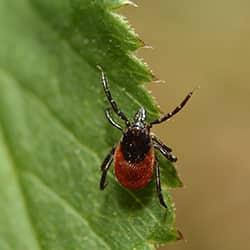How To Prepare For The Return Of Tick Season In New England
June 19, 2019

In: Ticks
At last, we have reached the brilliant warm months of summer. Now that spring has passed, we can let loose and enjoy the full trees, vibrant green scenery, bright sunshine, and vacation days that are part of what makes New England summers so enjoyable. After all, what’s not to love about the warmer weather? We can think of one thing: ticks.
Ticks are enjoying this change in the weather just as much as we are. Warmth provides ticks with what they need to thrive, while the season of summer encourages more outdoor activity from the hosts they need to survive upon - humans and animals. That said, it can be helpful to know which months of the year ticks are most active in order to avoid them.
When is tick season?
For most New England areas, tick season starts in early summer and ends in mid-fall. Contrary to popular belief, however, ticks do not just go away after tick season has passed. In fact, ticks are sometimes able to withstand New England winters by lying dormant under the snow and becoming active again when it gets warmer. Throughout the summer and into the fall, ticks are climbing onto hosts, laying eggs, and feeding on the blood of humans or animals. Once these eggs hatch (usually in early August), they will immediately try to find a host animal to feed on.
Tick Prevention Tips
When it comes to preventing ticks from being carried into your home or yard, you can usually break your prevention steps into a few different categories. The only way for ticks to enter your property is if they are brought there, which can be narrowed down to three scenarios:
-
You or your family members bring ticks to your home on your skin, clothing, or hair.
-
Your pets bring ticks into your home after playing outside.
-
Wildlife creatures bring ticks inside or onto your property.
With these three categories in mind, consider the following tick-prevention tips:
-
Inspect your clothing, skin, and hair for ticks before entering your home. If you find a tick on your skin, gently pull it off with a pair of tweezers.
-
Trim your grass short, get rid of weeds, and remove thick brush from your property.
-
Equip your pets with vet-approved flea and tick collars and check their fur for ticks on a regular basis.
-
Seal all areas where wildlife creatures may try to invade, bringing their tick buddies with them. These areas may include gaps in your foundation, rips in window screens, damaged roofing, or cracks in your exterior walls.
Prevention tips like the ones listed above are always a good choice for tick prevention; however, these tips are not always the most effective solutions to your tick infestation. American Pest Solutions provides mosquito and tick treatments for New England homes. Your property will never be 100% protected from the diseases and annoyances of pests without a professional tick treatment and control plan.
If ticks are disrupting the enjoyment of your summer, contact American Pest Solutions today!
For Immediate Assistance Call (888) 324-7025
 Subscribe to blog
Subscribe to blog
- Recent Blog Posts
- March 19, 2024 - What To Do If You Spot A Bee's Nest On Your Western Massachusetts Property
- March 17, 2024 - Is Professional Squirrel Control Necessary In Hartford?
- March 17, 2024 - Earwig Control Made Simple For Homeowners In Western Massachusetts
- Categories
- Ants - (25)
- Bed Bugs - (62)
- Birds - (10)
- Biting Insects - (7)
- careers - (1)
- Carpenter Ants - (5)
- Carpenter Bees - (6)
- Carpet Beetles - (12)
- Clover Mites - (7)
- Cockroaches - (30)
- Tags
- cockroaches in greenfield - (1)
- pest birds in connecticut - (1)
- zika virus - (1)
- property inspection - (1)
- moisture problems - (1)
- fruit flies in western ma - (1)
- western mass carpenter ants - (1)
- preventing bed bugs - (1)
- bug identification in springfield - (1)
- flea and tick prevention - (1)
- View All Tags




